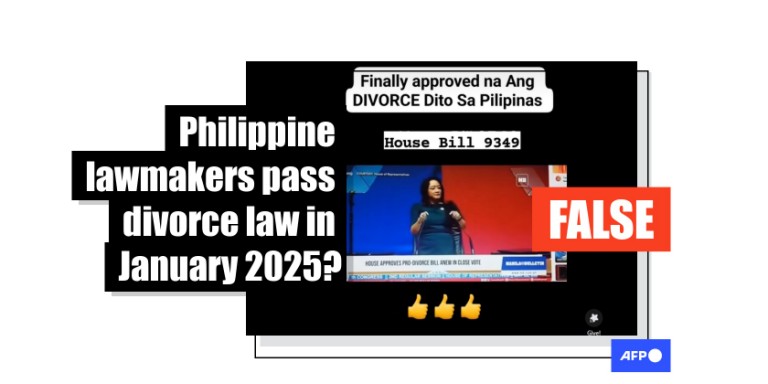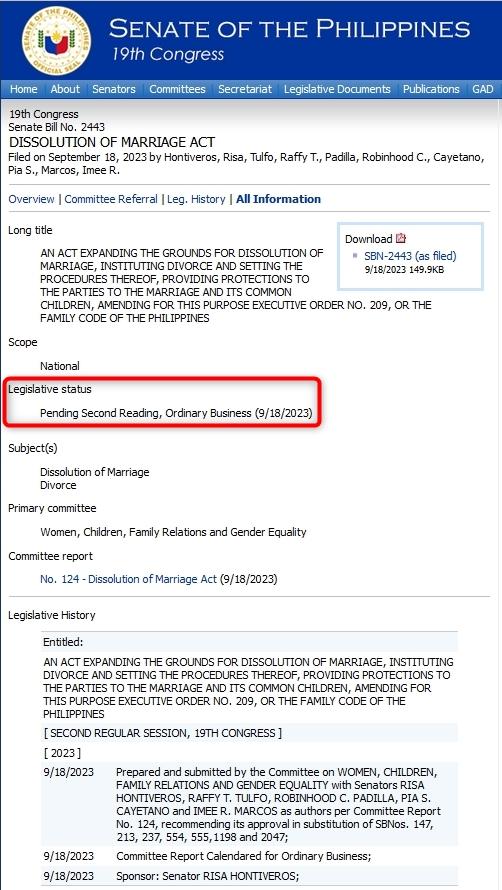
Divorce remains banned in Catholic-majority Philippines
- This article is more than one year old.
- Published on January 19, 2025 at 02:48
- 3 min read
- By Lucille SODIPE, AFP Philippines
"Finally, divorce has been approved in the Philippines," read the overlaid text on a Facebook reel shared on January 7, 2025.
It shows legislator Kristine Singson-Meehan, a deputy speaker of the House of Representatives, saying House Bill 9349, the "Absolute Divorce Act", has been "approved on third and final reading".

At present the only way to exit a failed union in the Philippines is to bring an embarrassing, expensive and labyrinthine civil case of annulment where a judge declares a marriage invalid on grounds that include the spouses having "psychological incapacity" (archived links here and here).
Applicants must undergo a mental exam, testify in court and sometimes even claim they or their spouse entered the union while afflicted by a disorder such as narcissism.
The process can take anywhere from one to 10 years to wind through the creakingly slow and overburdened Philippine court system and cost as much as $10,000 or more in a country plagued by poverty -- with no guarantee of success.
The most powerful opponent to divorce in the Philippines is the Catholic Church, which is also against abortion and contraceptives.
Around 78 percent of the country's 110 million people are Catholic, according to official census data, and many politicians are wary of contradicting the Church on sensitive social issues.
Similar claims that the Philippines legalised divorce were also shared on Facebook and TikTok.
Comments on the posts show people believed the posts. "Where do I go to file?" asked one. Another said, "Thank you it has been finally approved. I wonder how much this would cost?"
Misrepresented video
However, keyword searches found the video used in the posts published on the verified YouTube account of local broadsheet Manila Bulletin on May 22, 2024 (archived link).
"House approves pro-divorce bill anew in close vote," the clip's headline read.
The one-minute, 23-second clip was taken from a longer footage of the House of Representative's session streamed live on their official YouTube channel on the same day.
At the livestream's 1:45:32 mark, Deputy Speaker Singson-Meehan can be heard reading out the votes and announcing the measure had been approved by the 317-member House of Representatives (archived link).
Below is a screenshot comparison of the video in the false posts (left) and the one streamed live by the House of Representatives (right):

The bill only becomes law if the Senate, the upper house of Congress, also passes it and President Ferdinand Marcos fails to use his veto (archived link).
According to the Senate website, the measure is "pending second reading" and had not been approved as of January 19, 2025 (archived link).

The divorce bill is not one of the priority measures of President Ferdinand Marcos, as seen in a list from the Legislative Executive Development Advisory Council (LEDAC) dated December 9, 2024 (archived link).
Marcos heads the LEDAC, a body that determines the legislative priorities of the government.
Philippine fact-checking organisation Vera Files has also debunked similar claims.
Copyright © AFP 2017-2026. Any commercial use of this content requires a subscription. Click here to find out more.
Is there content that you would like AFP to fact-check? Get in touch.
Contact us
